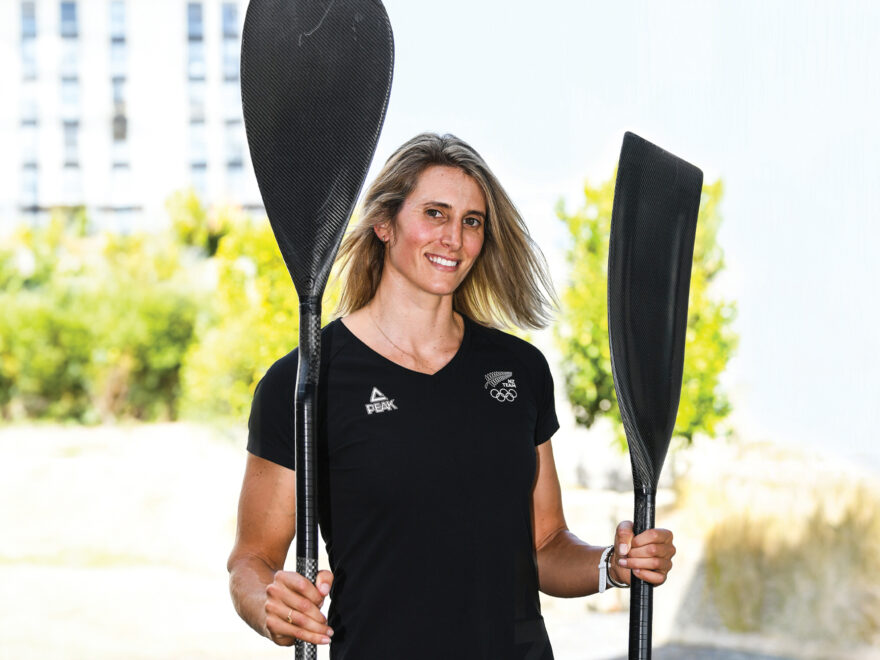Luuka Jones will carve her name into Kiwi Olympic history in Paris this year.
MARC HINTON reports
Kiwi whitewater paddler Luuka Jones is well used to doing things the hard way in this sport that’s been her life for most of the last two decades. But as she’s made her way towards a record-equalling fifth Olympic Games in Paris, this driven 35-year-old from Tauranga has found herself having to dig even deeper than usual to stay the course.
Jones is used to doing it tough. It goes with the territory in her wet ‘n’ wild sport. Ever since she had to up sticks as a hopeful teenager and immerse herself on the other side of the world to chase her ambitions, she has been doing things the hard way. You don’t become a world-class whitewater kayaker from the relative backwaters of New Zealand without taking yourself out of your comfort zone on a regular basis.
But as Jones now sits on the brink of joining an exclusive club by lining up at a fifth Olympic Games in Paris this year (July 26-August 11) – she and Finn Butcher will wear the silver fern in the canoe slalom discipline – she is able to reflect on the unique challenges that have gone into her final tilt on the grandest of sporting stages.
By lining up in France, Jones will join shot put queen Dame Valerie Adams and boardsailing marvel Barbara Kendall as the only Kiwi women to have competed at five Olympics. Not bad for an athlete who headed to the UK as a wide-eyed 19-year-old to train with the Great Britain team to get the experience required ahead of the Beijing Games in 2008 (where she became the first female canoe slalom paddler to represent New Zealand, and finished 21st).
It was all so unpromising back at the start of 2022 when the New Zealander was diagnosed with long Covid and forced to effectively take a year off competition. After a number of false re-starts, she was only able to return to the international circuit in ‘23 as she ploughed through the debilitating illness.
“I’d get really tired from just going out and mowing the lawn or going for a walk,” she said in one interview. “I’d have to go to bed afterwards because I was so tired. I basically had to go down to three activities a week.”
It was a year-long recovery studded with setbacks that required equal parts fortitude and patience. At one stage, after a couple of months’ recovery in ‘22, she felt well enough to head offshore for a training stint, but “almost fell off a cliff” with fatigue.
Later a neck injury and a string of illnesses took her to the verge of quitting.
“As I said to my fiancé every time I was coming back, ‘Is this something I want to do?’” she recalled. “There was always that doubt whether I could return to the top of the sport and whether I had more to give mentally and physically.”
Jones sought plenty of advice and guidance and eventually found a path through her illness. Now, she feels a resilience developed from braving such a long struggle, but also a nagging doubt or two.
“I go about my life normally, but there is this fear in the back of my mind … ‘What if I get it again? What if it hits me hard?’ In terms of my training, I’m very self-aware. I guess I’ve learned to read my body really well.”
It was not until the latter part of last year that Jones felt fully free of Covid’s grip, and she flexed that in October with a confidence-boosting World Cup gold medal in the new Olympic event of kayak cross at the same Vaires-sur-Marne venue hosting the Games canoeing.
That served up a healthy dollop of belief Jones could still contend in Paris, some eight years after taking her nation’s first Olympic whitewater canoeing medal with a memorable silver in the K1 at the Rio Games.
“I was definitely saddled with self-doubt when things weren’t going my way,” she recalled. “There was a change in training and a new coach, but it’s working really well and [the World Cup victory] shows I’m back to a really good position.
“I put a lot of pressure and expectation on myself [in Tokyo] and really didn’t enjoy it. I’d like to enjoy my last Olympic Games and if I’m in a good frame of mind and not expecting too much then I can achieve some great things.”
Marc Hinton
Sports Writer

